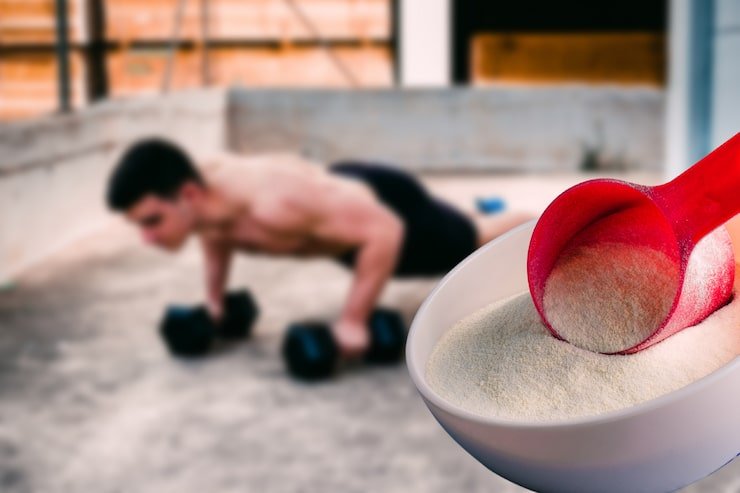How much pre-workout should You take? It’s a simple question, but the answer can change how you feel in the gym. Too little, and your workout may feel flat. Too much, and you could end up with jitters, nausea, or a restless night. In fact, studies show over 70% of people guess their pre-workout dosage instead of following safe, effective guidelines.
I’ve been there too. I once thought two scoops meant double the strength. Instead, I felt like I’d had ten cups of coffee and spent the night staring at the ceiling. That’s when I realized pre-workout isn’t about more, it’s about right.
Your body weight, caffeine tolerance, and fitness goals all play a role in how much you should take. This guide will break it down in simple steps. You’ll learn how to start small, adjust safely, and get the boost you need without the nasty side effects.
Table of Contents
ToggleWhat is Pre-Workout and Why Take It?
Pre workout is a supplement some people take before hitting the gym that’s supposed to increase your training session. Most formulations are powders mixed with water (though a few still take dry scooping for a spin not recommended).
These supplements typically include:
-
- Caffeine: Energizes the central nervous system (notably enhancing energy levels and alertness).
-
- Amino acids such as Beta Alanine: Increases muscle buffering potential, turned on to delay fatigue.
-
- Citrulline Malate Or Nitric Oxide Boosters : Promote blood flow to enhance pumps and stamina.
-
- Creatine Monohydrate: Helps produce ATP Strengthen and growth of muscle.
-
- Vitamin B: to aid in natural energy metabolism.
-
- Acetyl L-Carnitine: Aids in fat metabolism and endurance.
-
- Dietary nitrates (like red beetroot powder) : Improve cardiorespiratory endurance.
The goal of pre-workout isn’t magic it’s to help you push harder and recover faster so you get better fitness results over time.
How Much Pre-Workout Should You Take?

How many of pre-workout do you need? it depends on your body size, tolerance and the intensity of your training. Most products suggest a single scoop (150–300 milligrams of caffeine), but that’s not a one take answer.
Here’s how to approach it:
-
- Beginners: Start with ½ scoop. This reduces the chance of jitters, rapid heartbeat, or nausea.
-
- Experienced lifters: You may tolerate a full scoop, but always check the caffeine content first.
-
- Endurance athletes: A smaller dose may be best too much caffeine can upset the stomach during long runs or cycling.
The FDA recommends staying under 400 mg of caffeine per day. If you already drink coffee or energy drinks, you’ll need to account for that.
The Benefits of Taking the Right Amount
When it is used as directed, pre-workout can:
-
- Increase exercise intensity and focus.
-
- Improve muscle endurance and strength.
-
- Increase muscle glycogenolytic flux (your body’s ability to tap into stored energy during training).
-
- Delay fatigue so you can push through extra reps and improve weightlifting techniques.
-
- Support fat loss by keeping you energized during calorie deficits.
With the proper dosage, you can train closer to your full capacity.
Risks of Taking Too Much Pre-Workout

More is not always better. What Happens If You Take Too Much Pre-Workout?
-
- Jitters, anxiety, and rapid heartbeat.
-
- Stomach upset or nausea.
-
- Sleep Disturbance: Poor sleep if taken too late in the day.
-
- Risks of using the drugs long term, such as high blood pressure, kidney damage or dependence.
Can there be negative effects of pre-workout? According to the National Capital Poison Center, too much pre is dangerous to your health when mixed with caffeine in products used in conjunction with them.
That’s why it’s crucial to choose
Ingredient Breakdown: Finding the Right Dose
-
- Caffeine: 150–300 mg per scoop. Beginners should stick to 100–150 mg.
-
- Beta-Alanine: 2–5 g for improved muscular endurance (tingling is normal).
-
- Citrulline Malate: 6–8 g to boost nitric oxide and blood flow.
-
- Creatine Monohydrate: 3–5 g daily (often better taken separately for consistent muscle stores).
-
- B Vitamins: Support energy but don’t overstimulate.
-
- Acetyl L-Carnitine: 1–2 g for energy metabolism.
-
- Red Beetroot Powder / Dietary Nitrates: Enhance endurance and oxygen delivery.
Some advanced pre-workouts like ProSupps HYDE Xtreme or Outwork Nutrition products pack very high doses of stimulants. Beginners should approach these with caution or consider a stim-free supplement (a stimulant-free pre-workout) for safer energy support.
Practical Tips for Beginners
-
- Read the label carefully: not all scoops are equal.
-
- Start low: ½ scoop is plenty for your first try.
-
- Avoid stacking with energy drinks: you don’t need a caffeine overload.
-
- Stay hydrated: pre-workout increases fluid needs.
-
- Time it right: take it 30 minutes before workouts, never right before bed.
-
- Listen to your body: if you feel shaky, anxious, or nauseous, reduce your dose.
Trusted Sources and Science
Based on peer-reviewed scientific research as well as institutions like Memorial Hermann, pre-workout can enhance muscular endurance, strength and cardiorespiratory endurance but only if dose the dose is right.
The bottom line: safe, regular use is more valuable than striving for maximum impact.
Conclusion: How Much Pre-Workout Should You Take?
The safe amount of pre-workout for most people is about one scoop. That gives you around 150–250 mg of caffeine, which is the common dose. But everyone is different. Some people feel fine with less, while others can handle more. The best way to start is with half a scoop. See how your body reacts before you add more.
Think of it like dipping your toes in the water before jumping in. Starting small helps you avoid jitters, stomach upset, or a crash later. Remember, pre-workout is only a boost. It works best when you also get good sleep, eat well, and drink enough water.
Your right dose depends on tolerance, body weight, and goals. There’s no one-size-fits-all answer. Listen to your body, make small changes, and check with a doctor if you’re not sure. That way, pre-workout helps your training, not your stress.
FAQs
Is 2 scoops of pre-workout too much?
Yes, 2 scoops of pre-workout is usually too much and can cause jitters, nausea, or sleep issues. Stick to the label and start small. Learn more about safe dosing.
How much pre-workout is healthy?
A healthy pre-workout dose is 1 scoop or 150–250 mg caffeine for most people. This boosts energy without side effects. Learn more about finding your safe range.
Is 200 mg pre-workout good?
Yes, 200 mg of caffeine in pre-workout is a common and safe dose for many users. It gives energy without overstimulation. Learn more about adjusting to your needs.
How long will 400 mg pre-workout last?
A 400 mg pre-workout hit can last 4–6 hours, but it may cause jitters or sleep issues. Use caution with high doses. Learn more about safer energy boosts.
Is 200mg of caffeine a lot?
For most adults, 200 mg of caffeine is moderate—about two cups of coffee. It boosts focus and energy safely. Learn more about your personal caffeine tolerance.



